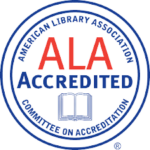Earn your degree in one year from a top 25 university
No GRE required
Designed to fit your schedule
Earn your degree in as little as one year from a top 25 university
No GRE required
Master of Management in Library and Information Science
Master of Management in Library and Information Science
USC’s online Master of Management in Library and Information Science (MMLIS) offers a unique and relevant experience in the constantly evolving field of library and information science. The MMLIS allows students to explore leadership and management strategies to prepare them for high-level career paths while learning information science fundamentals.
The MMLIS coursework has been designed for the online environment with engaging live sessions and online discussions meant to foster a sense of engagement, camaraderie, and empowerment. MMLIS students have the ongoing support of faculty and staff.
At USC Bovard College, students develop skills, perspectives, and networks that empower them to deliver sustainable and equitable impact in technologically, socially, and culturally connected libraries and information organizations.

The Master of Management in Library and Information Science program at the University of Southern California is accredited by the American Library Association Committee on Accreditation, with the status of Conditional accreditation. The next comprehensive review visit is scheduled for Fall 2027.
Learning Outcomes
Locate and evaluate information for targeted users and applications.
Create programs, collections, and services for meaningful impact across literacies and in information communities.
Lead with values that reflect professional and community aspirations.
Make data-driven decisions in information organizations using appropriate research and evaluation methods.
Deploy digital tools and technologies for the responsible use of information systems.
Integrate ethics, equity, inclusivity, accessibility, and anti-racism into library and information science practices.
Implement futurist strategies for information science systems and services.
Curriculum
A Master of Management in Library and Information Science degree requires 36 units of coursework offered in the fall, spring, and summer semesters. The program may be completed on a 1- or 2-year track. Students attending the program on the 1-year track can earn the degree within 12 months and those on the 2-year track can complete the program in less than two years.
For more information about program policies and procedures, please refer to the USC Student Handbook. Further information is provided to new students during orientation. You may contact us with any further questions.
LIM 500 Foundations of Library and Information Science (3 units)
History and evolution of libraries and information organizations, including their structure, funding, role in society, and impact on the communities they serve.
- Differentiate the types of libraries, their funding, organization, governance structure, clients, collections, and services.
- Distinguish the unique roles and competencies of information professionals.
- Evaluate the ethics and values inherent in library and information professions, managerial decision-making, and advocacy in different information organization and library contexts.
- Assess the impact of diversity, societal and economic values, globalization, and changing technologies on professional praxis.
- Formulate a critical perspective on opportunities and challenges to the information profession and information society through scholarly research.
LIM 502 User-Centered Collection Development (3 units)
Collection development focused on the needs of patrons, in service of the institutional mission to serve and partner with the broader community.
- Examine the function of collection development in library, archive, and information institutions.
- Evaluate the current challenges and trends impacting collection development today to be able to forecast strategies for the near future.
- Design collection development policies, programs, and tools that reflect professional and community values.
- Propose operational budgets for library and collection development.
- Develop a critical understanding about collection development through the lens of diversity, equity, inclusion, and accessibility.
LIM 503 Information Organization and Description for User Engagement (3 units)
Theories, standards, and tools for the organization and description of information with the goal of equitable and inclusive access for users.
- Develop resource descriptions with enhanced metadata in mind to facilitate access.
- Appraise the usability of various data assets and information discovery systems.
- Propose a data model and/or metadata schema to use when describing an information resource.
- Evaluate the information needs and perspectives of different groups of users with potentially competing priorities.
- Develop policies for metadata creation that encourage increased discoverability of library resources and usability of library search tools.
LIM 504 Social Science Research Methods in Library and Information Science (3 units)
Application of social science research methods in library and information science, including research question development, sampling, design methodologies, and data collection and analysis.
- Evaluate theoretical and practical research methods of social science information, experimentations, and scenarios.
- Analyze the fundamentals of designing, implementing, assessing, and utilizing a survey, a focus group, and content analysis in library and information science.
- Interpret social science data and information using statistical tools and scientific research techniques.
- Craft a research proposal statement that addresses important and relevant issues within information science research.
- Develop a literature review that synthesizes and provides context to a research proposal within information science.
LIM 509 Information Sources and Services (3 units)
Developments in reference and user services, including tools and processes for ethical information evaluation, retrieval, and delivery for users in diverse library settings.
- Evaluate information, databases, and sources to develop research questions, library programs, and information services based on theoretical concepts and critical information analysis.
- Evaluate information through the use of digital tools and technology.
- Appraise ethical issues in the retrieval, analysis, and delivery of information across diverse library settings.
- Create a research guide to support librarians’ appropriate and ethical use of information when developing programs with advanced technologies.
LIM 519 Leading Values-Driven Information Organizations (3 units)
Effective application of interdisciplinary, community-centered leadership concepts in libraries and information organizations, with a focus on mission-driven, inclusive strategic planning and change management.
- Evaluate interdisciplinary definitions of leadership for information organizations that reflect professional and community aspirations.
- Formulate resources to enhance community-centered strategic planning and co-design using equitable and inclusive techniques.
- Appraise research and evaluation methods for decision-making strategies, mission, and values in information organizations.
- Assess the complexities inherent in balancing tradition with disruption and how these factors affect strategic planning and change management.
- Create a strategic change management plan using scenario planning that integrates ethics, equity, inclusivity, accessibility, and anti-racism into library and information science organizations.
LIM 529 User Services and Community Engagement in Libraries (3 units)
Investigation of various users and communities served by libraries and information organizations, and the development of programs and services tailored to their needs.
- Apply theories and research pertaining to information use and behavior.
- Evaluate current issues related to ethics, equity, inclusivity, accessibility, and anti-racism in library and information science practices.
- Design tailored services and resources that information professionals use to serve and engage their communities.
- Critique progressive strategies for emerging technologies that impact the programs, collections, and services across literacies and in information communities.
- Create a tailored digital research, learning, and teaching (RLT) resource that reflects the information needs of one information community.
LIM 539 Project Management in Information Organizations (3 units)
Practical applications for leadership and management in library and information organizations, with particular emphasis on project management concepts and methods.
- Assess organizational opportunities or challenges specific to libraries and information organizations to establish a business case.
- Implement a project team charter.
- Create a comprehensive project management plan proposal, including a project charter.
- Evaluate stakeholders to utilize their expertise or meet their needs.
- Develop effective communication strategies to persuade or reach diverse groups of internal and external stakeholders.
- Devise a values-based leadership approach.
LIM 541 Archives and Digital Curation (3 units)
History and evolution of archival practice, and the strategies and tools needed for contemporary and future-facing archival management, preservation, and digital curation.
- Create archival resources according to contemporary professional practices, including: a mission statement, a finding aid, a digital arrangement plan.
- Demonstrate a working knowledge of digital curation methodologies and tools.
- Evaluate the unique needs of a breadth of archival materials (e.g., manuscripts, books, photographs, recorded sound, moving image, and digital content) that includes consideration for physical properties, historicity, and matters of diversity, equity, and inclusion.
- Show a working proficiency of archival practices: appraisal, arrangement, description, and access.
- Develop a professional framework for processing and curating archival collections, with an emphasis on funding as well as matters of access and inclusion to an increasingly diverse population of users.
LIM 549 Justice, Equity, and Ethics in Information Organizations (3 units)
History, theory, and potential of social justice in library and information organizations, with the goal of implementing services and programs for diverse stakeholders.
- Evaluate the challenges to diversity, equity, inclusion, and accessibility of the services and programs provided by information organizations.
- Create strategies for information organizations to promote social justice progress and equity in their communities.
- Assess governing intellectual freedom, privacy, or intellectual property laws affecting libraries and their stakeholders.
- Recommend best practices in ethical decision-making to information organization management processes and procedures.
LIM 562 Transformative Technologies in Library and Information Science (3 units)
Role of technology in libraries and information organizations, and potential use and ethical considerations of contemporary and emerging technologies to enhance library services.
- Assess the role of information technology in libraries and information agencies.
- Evaluate library technologies and standards.
- Propose technological solutions to enhance library services.
- Strategize IT planning, management, and integration.
- Recommend ethical, inclusive, and responsible technology practices.
LIM 598 Capstone in Library and Information Management (3 units)
Knowledge and skills gained throughout the MMLIS program are synthesized in a culminating capstone project, and deployed in service of career advancement.
- Develop an actionable, future-facing project to support an innovative idea for a program, service, or collection to positively impact the library and information science field.
- Integrate the program’s full range of concepts, tools, and frameworks to weave innovative professional practices into an actionable project.
- Integrate knowledge gained throughout the program into employment materials that support finding a new or advancing in a current position.
- Create a professional diversity statement illustrating a clear, actionable plan to address diversity, equity, inclusion, accessibility, and anti-racism in current or future work.
- Plan intentional ethical practice to promote critical consumption of information; diversity, equity, inclusion, accessibility, and anti-racism; and lifelong learning as central aspects of the profession.



